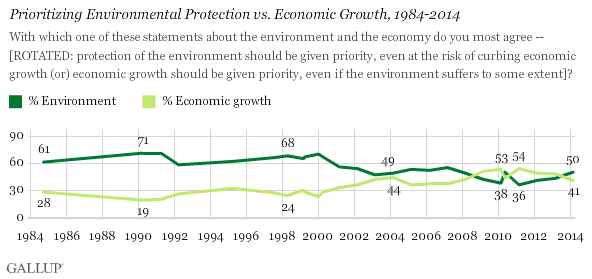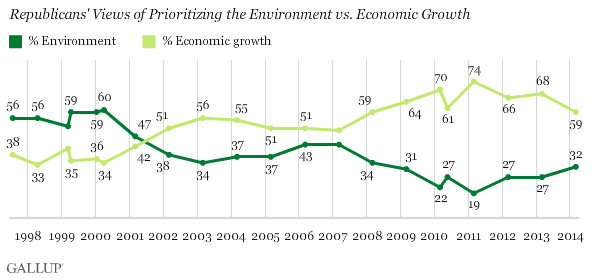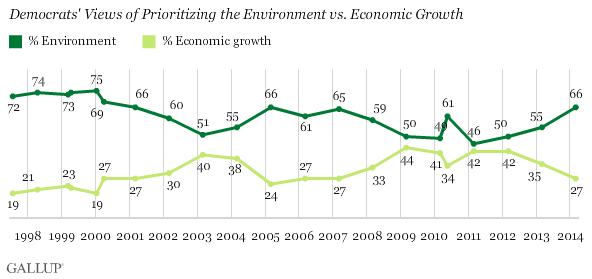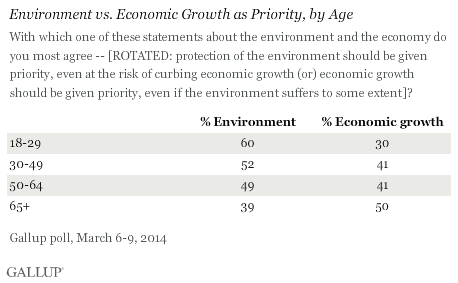By Glynn Wilson –
If given a choice, a majority of Americans by a 50 percent to 41 percent margin are more likely to say protecting the environment should be given priority even at the risk of curbing economic growth, even though the risk of curbing economic growth from government regulations on corporations to prevent pollution does not really exist in the real world.
This is a fake political-economic controversy, ginned up by company public relations hacks and their bought-and-paid-for politicians, driven by the two-sided economic definition of objectivity pushed by the mainstream American news media to drive its profits by making believe there are two sides to every story.
“In the 30 years that Gallup has asked this question, Americans have almost always chosen the environment over economic growth as a priority,” Gallup says in reporting on the latest poll on the subject.
The exception to the rule came in 2009-2010, during the Bush Great Recession, when Americans generally prioritized economic growth over the environment, according to Gallup, until just after the BP oil spill in the Gulf of Mexico in May 2010.
In 1990 and 1991, in the aftermath of the Exxon Valdez spill in Alaska’s Prince William Sound and in the heyday of professional environmental journalism in the U.S., the percentage of Americans who prioritized the environment swelled to 71 percent, as opposed to 19 percent who cared more about immediate economic growth than the future of the planet.
According to Gallup, 1990 is notable for the mass revival of Earth Day, begun in 1970 by Wisconsin Sen. Gaylord Nelson as a way to boost environmental awareness. The 20th anniversary of Earth Day attracted hundreds of conservation groups to pressure the government for tighter environmental regulations on big business.
But just as on most other issues in American life, Democrats and Republicans are sharply divided on this question, with about two-thirds of Democrats favoring environmental priorities and only one-third of Republicans.
“This is the largest partisan gulf since 1997, mainly as result of the sharp rise among Democrats prioritizing the environment higher than economic growth,” Gallup says. “Both parties give higher priority to the environment than they did prior to the 2008-2009 economic recession.”
A majority of both Republicans and Democrats prioritized the environment prior to George W. Bush becoming president in 2001, Gallup reports, with the data showing a relationship between the drop in concern among Republicans coinciding with President Bush placing less of a priority on the environment. During the Bush era, the Bush administration did not take part in the Kyoto Protocol, an international agreement to reduce climate change due to global warming from the burning of fossil fuels. The Bush political machine, funded largely by big business, pushed the notion that the cost of protecting the environment was prohibitive to the U.S. economy.
Since 2001, Republicans have chosen economic growth over the environment, with the largest gap between the two parties occurring in 2011, when economic growth was favored over the environment by a margin of 74 percent to 19 percent. Gallup’s data, however, shows a softening of this trend in recent months.
The percentage of Democrats choosing the environment over economic growth surged 11 percentage points in the past year and 20 points since 2011.
“This increase suggests that Democrats may believe the economy is improving and it is now acceptable to favor protecting the environment, even if it curbs economic growth,” Gallup says.
As the leader of the Democratic Party, President Barack Obama has made climate change one of his top priorities for his second term, and the 66 percent of Democrats who prioritize the environment over economic growth is the highest since 2000.
Among age groups, Americans aged 18 to 29 are most likely to say the environment should be given priority over economic growth by a margin of 60 percent to 30 percent. Americans over 65, on the other hand, say economic growth should be prioritized by a margin of 50 percent to 39 percent.
“Both 30- to 49-year-olds and 50- to 64-year-olds prioritize the environment over economic growth, but the gap between the two topics narrows as the age group becomes older,” Gallup says.
Gallup’s Bottom Line
When Americans prioritize the environment over economic growth, it could be a sign that they perceive a healthier U.S. economy, according to Gallup. The public opinion survey company index of Economic Confidence has being showing public opinion rebounded on confidence in the economy since the Bush Great Recession in recent months, suggesting Americans believe the U.S. economy is improving.
“Perhaps the gap between Republicans and Democrats on the issue of prioritizing the environment or economic growth since 2001 can be explained by the increasing polarization between the two parties over the issue of climate change and global warming,” Gallup concludes.
Survey Methods
Results for this Gallup poll are based on telephone interviews conducted March 6-9, 2014, on the Gallup Daily tracking survey, with a random sample of 1,048 adults, aged 18 and older, living in all 50 U.S. states and the District of Columbia. For results based on the total sample of national adults, the margin of sampling error is plus or minus 4 percentage points at the 95 percent confidence level.

















